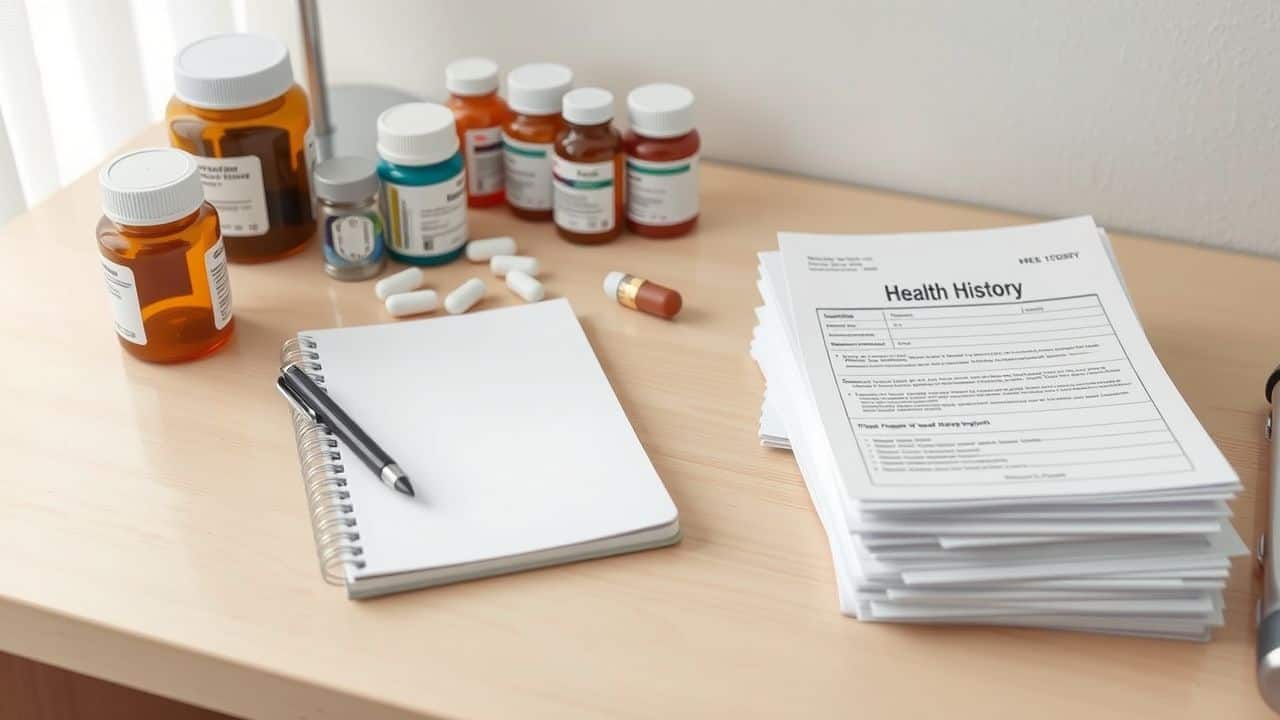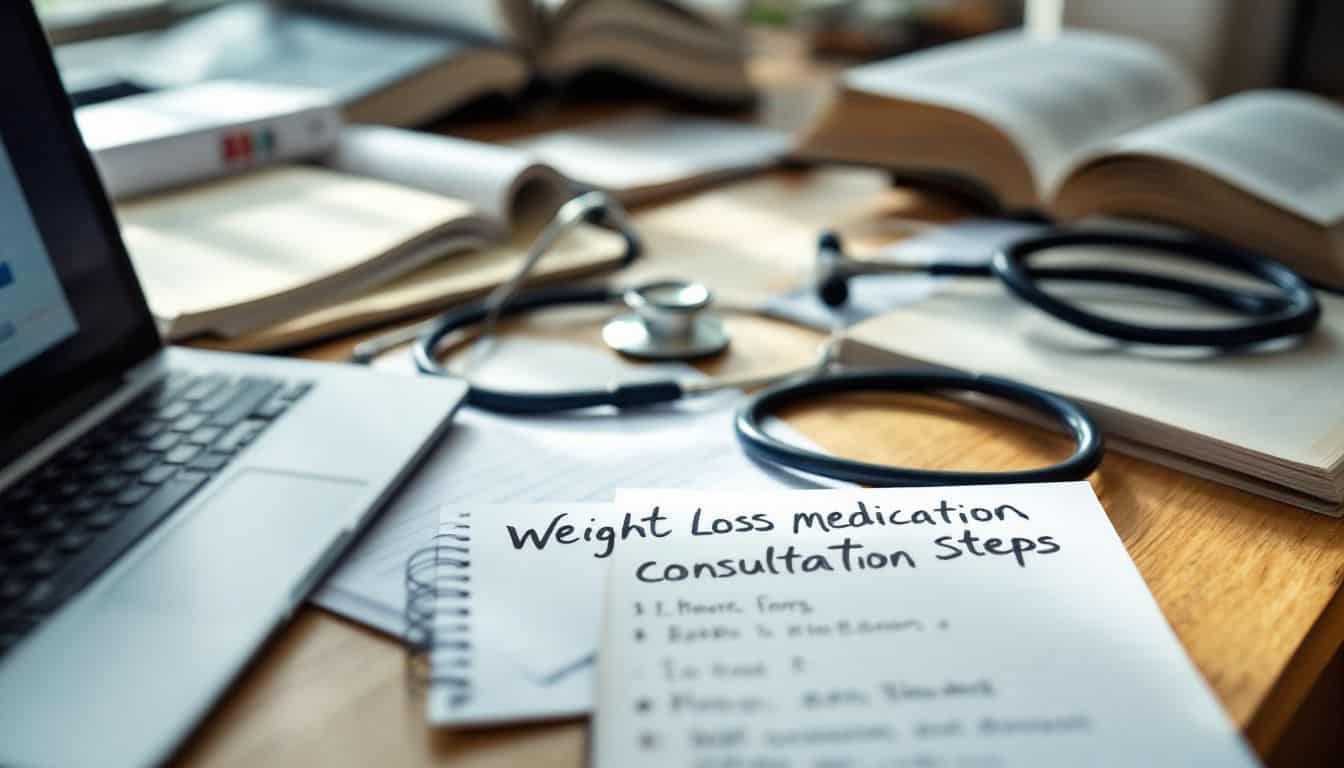Talking to your doctor about weight loss medication can feel scary. But don’t worry – you’re not alone. Many people struggle with this chat. How to talk to your doctor about weight loss medication is easier than you think.
Here’s the scoop: we’ve got 6 expert steps to help you out. Ready to feel more confident at your next appointment?
Key Takeaways
Prepare for your doctor visit by reviewing your medical history, listing current medications, and setting clear weight loss goals.
Choose a good time during your appointment to bring up weight loss medications, and be open about your weight loss challenges.
Common weight loss medications include bupropion-naltrexone, liraglutide, orlistat, phentermine-topiramate, semaglutide, and setmelanotide.
Side effects of weight loss medications can include nausea, headaches, and stomach issues, but they’re often mild and short-lived.
If medication isn’t suitable, try other strategies like regular exercise, healthy eating, tracking food intake, getting enough sleep, and managing stress.
Table of Contents
Preparing for the Discussion with Your Doctor

Getting ready to chat with your doc about weight loss meds? It’s smart to do some homework first. Jot down your health history and current pills – it’ll make the talk go smoother.
Review Your Medical History

Before you chat with your doctor, take a close look at your health story. Jot down any past health issues, surgeries, or ongoing problems. This helps paint a clear picture for your doc.
Don’t forget to list all the meds you’re taking – even over-the-counter stuff and vitamins. According to Dr. Michael Snyder at FuturHealth, knowing your full medical history is key to finding the right weight loss plan.
Your medical history is like a roadmap for your health journey. It guides us to the best path forward.
Next up, we’ll talk about listing your current medications. This step is crucial for your doctor to understand how new meds might mix with what you’re already taking.
List Your Current Medications

Knowing your current meds is key when talking to your doc about weight loss drugs. It’s smart to have a full list ready before your visit. Here’s what to include:
- Prescription medications: Jot down all the pills, shots, or patches you take daily. Don’t forget those once-a-week or monthly meds too.
- Over-the-counter drugs: Think pain relievers, allergy meds, or vitamins. These count too!
- Herbal supplements: Your doc needs to know about any natural remedies you’re taking.
- Dosages: Write down how much of each med you take. “Two pills twice a day” is perfect.
- How long you’ve been taking each med: This helps your doc spot any links between your meds and weight.
- Any recent changes: Did you start or stop any meds lately? Make a note of it.
- Side effects: If a med makes you feel off, your doc should know.
- Allergies: List any drugs that have given you bad reactions before.
Having this list ready will help your chat about weight loss meds go smoothly. Now, let’s look at how to kick off that talk with your doctor.
Define Your Weight Loss Objectives

Setting clear weight loss goals is key. Think about why you want to shed pounds. Is it for better health? More energy? To fit into old clothes? Write down your reasons. They’ll keep you going when things get tough.
Also, decide on a realistic target weight. Losing 1–2 pounds per week is healthy and doable for most folks. Don’t forget to set a move goal to lose weight too.
It’ll help you stay active and burn extra calories.
Your doctor needs to know your goals to give the best advice. They’ll help you pick the right weight loss meds – if you need them. Be ready to talk about how much weight you want to lose and by when.
Your doc might suggest tweaks to make your goals more doable. Next up, let’s chat about how to kick off this important talk with your healthcare pro.
Starting the Conversation About Weight Loss Medication

Talking about weight loss meds with your doc can feel scary. But don’t sweat it – with a little prep, you’ll be ready to chat about your options like a pro.
Select the Optimal Time During Your Consultation
 Timing is key when talking to your doctor about weight loss meds. Pick a moment when you’re both relaxed and not rushed. Maybe after your vitals are checked, but before the exam starts.
Timing is key when talking to your doctor about weight loss meds. Pick a moment when you’re both relaxed and not rushed. Maybe after your vitals are checked, but before the exam starts.
This sweet spot gives you enough time to chat without feeling hurried. Your doc will be more open to hearing your thoughts then.
Don’t wait till the end of your visit to bring it up. By then, your doctor might be thinking about the next patient. Instead, mention it early on. Say something like, “I’d like to discuss weight loss options today, including medications.” This sets the stage for a good talk.
Your doctor will know what to expect and can plan the visit around your needs.
Discuss Your Weight Loss Challenges

Let’s talk about your weight loss struggles. It’s time to open up to your doctor. Be honest about what’s worked and what hasn’t. Maybe you’ve tried diets that left you hungry and cranky.
Or exercise plans that fizzled out fast. Share these ups and downs with your doc. They need the full picture to help you best.
Don’t hold back on the tough stuff. Tell them about late-night snacking or skipping workouts. Mention if stress eating is your go-to comfort. Your doctor’s there to help, not judge.
This chat sets the stage for talking about weight loss meds. It shows why you might need extra help beyond diet and exercise. Next up, we’ll dive into bringing up those medications with your doctor.
Mention Your Interest in Weight Loss Medication

Chat with your doctor about weight loss medication. It’s fine to mention, “I’m considering weight loss medication.” Your doctor’s there to assist, not criticize. They might ask about your interest.
Be open about your challenges. Perhaps diets haven’t worked long-term, or exercise alone isn’t enough. Share these details.
Feel free to mention specific medications you know. “I’ve heard of Contrave. Could that be an option for me?” This shows you’ve researched a bit. It also gives your doctor a starting point for discussion.
Keep in mind, over 40% of U.S. adults face obesity. You’re not alone in seeking help.
Learning About Weight Loss Medication Options

Getting into weight loss medications can feel like a lot – tons of choices, tons of questions! But no worries, we’re here to help. Read on to learn about popular pills, their good and bad points, and what side effects you might experience…
Common Weight Loss Medications Available

Weight loss medications can be a game-changer for many women. Here’s a look at some common options your doctor might suggest.
- Bupropion-naltrexone: This combo drug affects brain chemicals to reduce hunger. It’s like having a built-in willpower boost!
- Liraglutide: A daily injection that copies a gut hormone. It signals your brain you’re full, so you eat less without feeling deprived.
- Orlistat: This pill stops fat absorption in your gut. It’s been available for years and can help you lose about 10% of your weight.
- Phentermine-topiramate: A two-in-one pill that reduces appetite and makes you feel full faster. It’s one of the most effective options available.
- Semaglutide: The latest addition. It’s a weekly shot that can lead to significant weight loss – up to 15% of your body weight.
- Setmelanotide: This one’s for rare genetic conditions. It focuses on specific brain pathways to control hunger in people with certain disorders.
These meds can help you lose 3% to 12% more weight than just diet and exercise alone. But they’re not magic pills. They work best with healthy eating and regular physical activity. Ask your doctor about which one might be right for you.
Advantages and Disadvantages of These Medications
Weight loss meds can be a game-changer for some women. But like any tool, they come with pros and cons. Let’s break it down:
| Advantages | Disadvantages |
|---|---|
• Can help shed extra pounds • May improve overall health • Reduces risks linked to obesity • Might boost confidence | • Possible side effects (nausea, headaches) • Can be pricey – insurance might not cover • Weight may come back after stopping • Serious side effects possible (high blood pressure) |
It’s a mixed bag, ladies. These meds can give you a leg up on your weight loss journey. They might help you drop those stubborn pounds faster. Plus, shedding extra weight often leads to better health overall. That’s a win-win!
But… there’s always a but, right? Side effects can be a real pain – literally. Nausea, headaches, and tummy troubles aren’t fun. And let’s talk money. These pills can hit your wallet hard if insurance doesn’t play ball.
Here’s the thing – once you stop taking them, the weight might creep back on. It’s like a sneaky ex who won’t stay away! And in rare cases, more serious issues like high blood pressure can pop up.
So, what’s a gal to do? Chat with your doc. They’ll help you consider the good, the bad, and the ugly. Keep in mind, there’s no magic pill… but these meds might be the boost you need to kickstart your health journey.
Possible Side Effects of Medications
Now that we’ve covered the pros and cons, let’s talk about what might happen when you take these meds. Weight loss drugs can be a game-changer, but they’re not without their quirks. Here’s what you need to know about possible side effects:
- Tummy troubles: About half of the folks who take GLP-1 meds deal with stomach issues. You might feel queasy, throw up, or have heartburn. Some people get bloated or have cramps. Others end up running to the bathroom… or not going at all.
- Mild and short-lived: Good news! These side effects usually aren’t too bad and don’t last long. But they can make it hard to stick with your meds.
- Easing in: Doctors start you on a low dose and slowly bump it up. This helps your body get used to the medicine without freaking out.
- Headaches: Some women get headaches when they start these meds. It’s like your body’s way of saying, “Hey, what’s this new thing?”
- Feeling tired: You might feel a bit worn out at first. It’s normal, and it usually gets better as your body adjusts.
- Dry mouth: Your mouth might feel like the Sahara Desert. Keep a water bottle handy!
- Changes in taste: Some foods might taste different. It’s weird, but it can happen.
- Dizziness: You might feel a bit woozy, especially when you first start. Take it easy and don’t rush.
- Hair thinning: This is rare, but some women notice their hair getting thinner. It usually grows back when you stop the meds.
- Mood swings: Your emotions might be on a roller coaster for a bit. It’s not fun, but it usually settles down.
Questions to Pose to Your Doctor

Ready to chat with your doc about weight loss meds? Don’t clam up! Arm yourself with smart questions. They’ll help you get the lowdown on what’s best for your body and lifestyle.
Which Medications Are Suitable for Me?
Your doctor knows your health best. They’ll look at your weight, health issues, and other meds you take. Popular weight loss drugs include Qsymia, Contrave, Wegovy, and Zepbound. GLP-1 agonists like Wegovy and Zepbound are hot right now.
You only need to take them once a week.
Your doc might suggest one that fits your needs. They’ll think about side effects and how it works with your other pills. Don’t be shy to ask about each option. Your health matters, so speak up! Now, let’s talk about what side effects you might face….
What Side Effects Can I Expect?
After learning which meds might work for you, it’s time to talk side effects. Let’s face it – no pill is perfect. Common issues with weight loss drugs can be a real pain… literally! Nausea, diarrhea, and tummy troubles top the list.
I started taking a GLP-1 drug – my stomach was not happy for the first few weeks.
Some meds like orlistat can cause oily poop (gross, I know). Others may lead to constipation or upset stomach. In rare cases, serious problems like pancreatitis can happen. It’s important to talk with your doc about what to watch for.
They can help you consider the pros and cons. Don’t be shy – ask about all possible side effects, from minor to major. Knowing what to expect helps you decide if a med is right for you.
How Will the Medication Interact With My Other Prescriptions?
Mixing meds can be tricky business. Your weight loss pills might not play nice with other drugs you’re taking. That’s why it’s crucial to spill the beans about all your prescriptions to your doc.
Give ’em the full scoop – even those vitamins you pop daily. This way, they can spot any potential clashes and keep you safe. I once forgot to mention my allergy meds and ended up with a nasty reaction.
Trust me, it’s better to be upfront!
Your doctor’s got the know-how to figure out if your new weight loss meds will mesh well with your current lineup. They might need to tweak doses or switch things up a bit. Don’t worry – they’ve got your back.
They’ll make sure you’re not doubling up on similar meds or canceling out their effects. It’s like a puzzle, and your doc’s the pro at putting all the pieces together for your health.
What Lifestyle Adjustments Are Necessary with Medication?
Moving from drug interactions to lifestyle changes, let’s talk about what you’ll need to do when taking weight loss meds. Your doctor might suggest some tweaks to your daily routine.
These changes can help the meds work better and keep you feeling good.
First up, you’ll probably need to watch what you eat. Most weight loss drugs work best with a healthy diet. You might need to cut back on snacks or swap out junk food for veggies. Exercise is key too.
Even a short walk each day can boost your results. Some meds can make you thirsty, so drinking more water is a must. Lastly, you may need to avoid alcohol or certain foods that don’t mix well with your pills.
Your doctor will give you the scoop on what’s best for you.
Alternatives If Medication Is Not Suitable

If weight loss meds aren’t right for you, don’t worry! Your doc might suggest other cool ways to shed those pounds. Wanna know more? Keep reading!
Other Strategies for Weight Loss
Weight loss isn’t just about pills. There are many ways to shed pounds without medication. Here’s a list of other strategies you can try:
- Move more: Regular exercise is key. Aim for 30 minutes of activity most days. Try walking, swimming, or even dancing in your room. It’s fun and burns calories!
- Eat smart: Focus on whole foods. Fill your plate with fruits, veggies, lean proteins, and whole grains. These foods keep you full longer and provide essential nutrients.
- Track your food: Keep a food diary. Writing down what you eat makes you more aware of your habits. It can help you spot areas for improvement.
- Get enough sleep: Lack of sleep can mess with your hunger hormones. Aim for 7-9 hours each night to help control cravings.
- Manage stress: High stress can lead to emotional eating. Try yoga, meditation, or deep breathing to calm your mind and body.
- Drink water: Sometimes thirst feels like hunger. Drink a glass of water before meals. It can help you eat less and stay hydrated.
- Plan your meals: Prep healthy meals in advance. This helps avoid impulse eating and unhealthy food choices when you’re busy or tired.
- Find support: Join a weight loss group or team up with a friend. Having someone to share your journey with can boost motivation.
- Set realistic goals: Aim to lose 1-2 pounds per week. This slow, steady approach is more likely to lead to lasting results.
- Celebrate small wins: Don’t just focus on the scale. Notice how your clothes fit better or how you have more energy. These non-scale victories matter too!
Getting a Referral to a Weight Loss Specialist
If other weight loss plans don’t work, your doctor might suggest seeing a specialist. This expert can give you more help with losing weight. They know all about special diets and pills that could work for you.
Your doctor can send you to this kind of expert – it’s called a referral.
Getting a referral is easy. Just ask your doctor about it during your visit. They’ll look at your health records and decide if a specialist is right for you. The specialist might team up with other pros like diet coaches or exercise teachers.
This team approach can really boost your chances of success. Don’t be shy about asking for this extra help – it could be just what you need to reach your goals.
People Also Ask
How do I know if I need weight loss medication?
If you’re carrying extra pounds and struggling to shed them, it might be time to chat with your doc. They’ll check your body mass index (BMI) and look at your overall health. If you’ve got conditions like type 2 diabetes or high cholesterol, meds could be a game-changer.
What weight loss drugs are out there?
There’s a buffet of options! Ozempic, Saxenda, and Mounjaro are some popular injectables. Xenical is a pill that blocks fat. Your healthcare provider can help you pick the best fit for your body and goals. Remember, these aren’t magic pills – they work best with diet and exercise.
Will my insurance cover weight loss medication?
It’s a mixed bag. Some plans cover FDA-approved meds, while others give you the cold shoulder. Medicare can be tricky too. Your best bet? Ring up your insurance company and ask about coverage. If they say no, don’t lose hope – your doctor might know some tricks to help you out.
What side effects should I watch out for?
Like any drug, these can come with some unwanted guests. Nausea, abdominal pain, and constipation are common party crashers. Some folks might experience more serious issues like inflammation of the pancreas or gallbladder attacks. Your doctor will give you the full scoop on what to expect.
How long will I need to take weight loss medication?
This isn’t a one-size-fits-all situation. Some people take these meds for a few months, others for years. It depends on your health, how much weight you need to lose, and how your body responds. Think of it as a marathon, not a sprint. Your doctor will keep tabs on your progress and adjust as needed.
Can I just buy weight loss pills without seeing a doctor?
Hold your horses! Buying diet pills without a prescription is like playing Russian roulette with your health. These meds can mess with your body in serious ways if not used right. Plus, a doctor can check if you’ve got underlying issues causing weight gain. They’re your partner in this journey, so don’t skip the chat with your healthcare provider.
References
https://www.myjuniper.com/blog/ask-your-doctor-about-weight-loss (2024-08-12)
https://www.healthline.com/health/how-to-ask-your-doctor-for-weight-loss-pills (2024-01-16)
https://primehealthofnj.com/how-to-ask-your-doctor-for-weight-loss-pills/ (2024-10-15)
https://www.mayoclinic.org/healthy-lifestyle/weight-loss/in-depth/weight-loss-drugs/art-20044832
https://islandrheumatology.com/advantages-and-disadvantages-of-weight-loss-drugs/ (2023-11-13)
https://www.siumed.edu/blog/how-deal-side-effects-weight-loss-medications (2024-02-12)
https://obesitymedicine.org/blog/5-common-weight-loss-medications-their-side-effects-obesity-medicine-association/ (2024-01-20)
https://www.mayoclinic.org/healthy-lifestyle/weight-loss/in-depth/weight-loss/art-20047752 (2024-06-22)
